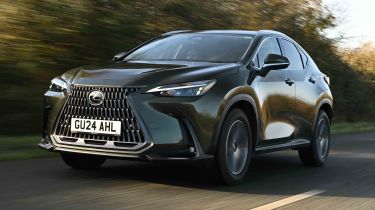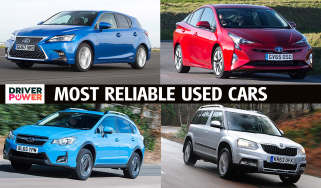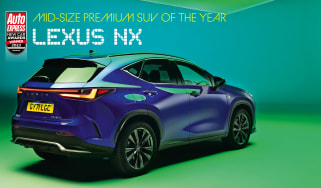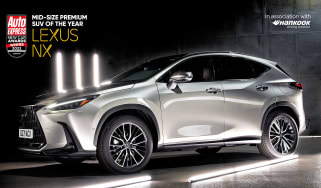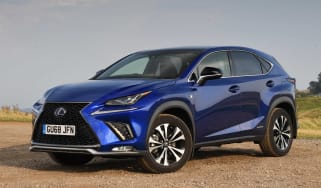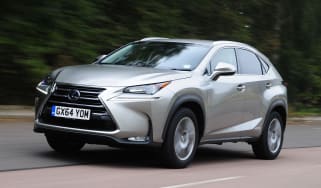Lexus NX review
A hybrid pioneer, the Lexus NX remains a strong choice due to its great all-round appeal

Our opinion on the Lexus NX
The Lexus NX is a well known quantity in the premium compact SUV class, and as its multiple gongs in our New Car Awards in recent years prove, it’s one of the best models around. A range of efficient powertrains, and the many strengths that you’d expect from Lexus – chiefly refinement and reliability – with others that are more of a surprise, such as keen driving dynamics and a competent infotainment system, entirely justify the NX’s spot among the class leaders. Each passing year makes it harder to cling to the top spot, however, and with the latest BMW X3, Mercedes GLC and Audi Q5 to contend with, it certainly has its work cut out.
| Key specs | |
| Fuel type | Hybrid, plug-in hybrid |
| Body style | Mid-size SUV |
| Powertrain | 2.5-litre, 4cyl petrol plus 1x e-motor, front-wheel drive 2.5-litre, 4cyl petrol plus 1x e-motor, four-wheel drive 2.5-litre, 4cyl petrol plus 2x e-motors, 18.1kWh battery, four-wheel drive |
| Safety | Five stars (Euro NCAP, 2022) |
| Warranty | 3yrs/60,000 miles (up to 10yrs/100k miles with routine franchised dealer servicing) |
About the Lexus NX
While models such as the Lexus LS and Lexus RX established Lexus as a premium alternative to the German ‘big three’ of Audi, BMW and Mercedes, the NX is arguably the car that helped boost its market share. The second generation also advanced the company’s hybrid technology, with the arrival of a plug-in version for the first time.
The NX slots just below the RX, and above the Lexus UX, in the UK Lexus range and it competes squarely in the premium compact SUV sector. It’s been a strong contender in Mk2 guise thanks to its efficient hybrid powertrains and upmarket cabins. There’s just one five-door, five-seat bodystyle offered, with the slightly rakish shape fitting somewhere between the standard and coupe-SUV styles offered by rivals.
Used - available now
Prices for the Lexus NX start from around £45,000, while opting for four-wheel drive adds an extra £1,500. The plug-in hybrid version is pricier at £50,000, while at the top of the range the most expensive model is over £62,000.
The trim line-up comprises Urban, Premium, Premium Plus, F Sport, Takumi and the combined F Sport Takumi, although not all trims are available with both powertrains: you can’t get F Sport at the entry point of the line-up, for example, while Urban trim isn’t offered at the top of the range.
There are two powertrain options in the UK, badged NX 350h and NX 450h+. These two are largely identical in terms of configuration, but the plus sign on the latter signifies that it’s the plug-in hybrid version featuring a bigger battery for a longer range running purely on electricity. It’s worth noting that F Sport is just a trim level, because there’s no performance model offered.
All cars come with Lexus’s well developed CVT-style gearbox that manages energy flow between the petrol engine, electric motor, battery and wheels, and many years of development and refinement mean it’s a far smoother transmission than in previous models. Front-wheel drive is standard for the NX 350h, while four-wheel-drive is offered with the addition of a second electric motor to the back axle. The NX 450h+ has this set-up as standard, plus an 18.1kWh battery.
Performance & driving experience
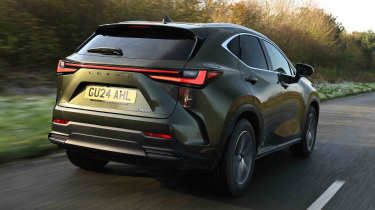
| Pros | Cons |
|
|
Hybrid tech has been a Lexus staple for years, and with every new model, the systems feel smoother and more refined than ever.
Here, the NX uses a near-identical layout to the one that’s fitted to the Toyota RAV4: a 2.5-litre four-cylinder petrol engine, with 187bhp and 239Nm of torque, backed up by electrical assistance via either one or two hybrid motors.
In the case of the entry point to the NX range, it takes the form of a single, front-mounted electric motor that makes 178bhp and 270Nm of torque. Above this, four-wheel-drive models gain a second electric motor at the back, adding a further 53bhp and 121Nm. Because of the ability of the hybrid’s battery to deploy that energy, the system output of the two-wheel-drive and four-wheel-drive versions of the NX 350h are the same, with 241bhp in each instance. Lexus doesn’t quote peak system torque figures for its cars, just the figures for the engines and electric motors.
The plug-in hybrid NX 450h+ has a maximum output of 302bhp, with the petrol engine making 183bhp (4bhp less than the front-wheel-drive NX 350h), the same 183bhp for the front electric motor, and 53bhp for the rear motor.
Performance, 0-60mph acceleration and top speed
There’s a 0-62mph time of 8.7 seconds for the front-wheel-drive version of the NX 350h, while the extra boost from the second electric motor at the rear allows the AWD model to be one second quicker than that.
The plug-in hybrid’s larger 18.1kWh battery can deploy more motor energy to the wheels at once, so despite this version’s 180kg weight penalty for lugging the larger battery pack, it can cover the 0-62mph dash in just 6.3 seconds. All versions of the Lexus NX have a top speed of 124mph.
Town driving, visibility and parking
Lexus and parent company Toyota have built more hybrids than anyone, so it’s no surprise to discover that the NX has an extremely slick system. Moving off on electric power alone is smooth, and when the engine cuts in, only a subdued hum from the engine gives the game away.
The suspension set-up is soft, but on slower, more pockmarked roads, it can fidget a little more than some of the more dynamic-focused competition in this segment. It’s never harsh or crashy, although it does tend to jiggle about a little on broken road surfaces.
B-road driving and handling
Despite that soft suspension set-up, the NX doesn’t particularly feel at sea on a twisty road. Sure, it can’t be thrown around like a hot hatchback, but for a car of this size, it remains calm, composed and fairly competent when things start to tighten up. The steering is precise and well weighted, too. The Lexus strikes a better balance between ride and handling than the Audi Q5 and Volvo XC60, for example, while the Mercedes GLC has a small edge in overall refinement. The BMW X3 leads the way from behind the wheel in the segment, topping the Lexus both in terms of handling and comfort.
Due to the NX’s e-CVT transmission, the 2.5-litre engine will flare up with plenty of revs under hard acceleration, but it’s well isolated from the cabin, so it rarely sounds harsh or unpleasant. This effect is reduced as you climb the power band, because the extra electrical assistance in the four-wheel-drive full-hybrid model means that the petrol engine doesn’t need to work quite as hard. The same is true with the plug-in hybrid.
Motorway driving and long-distance comfort
It’s generally the German alternatives that feel the most stable at high speed, but the Lexus remains a comfortable and refined place in which to while away long distances. At cruising speeds, the engine remains perfectly quiet and feels isolated from the cabin, too.
Expert view, on driving experience
“Hybrids and PHEVs are a great stepping stone into full EV ownership, and Lexus offers two compelling reasons to hold out on that tech. The first is that it does hybrids better than almost anyone else, while the other is that its EVs aren’t yet up to the high standards of some rivals. The all-electric RZ is a similar size to the NX, is great to drive and fairly quick, but when it comes to overall range and efficiency, it can’t compare.”
Alex Ingram, chief reviewer, conducted a twin test between the NX and the latest BMW X3
| Model | Power | 0-62mph | Top speed |
| NX 350h | 241bhp | 8.7 seconds | 124mph |
| NX 350h AWD | 241bhp | 7.7 seconds | 124mph |
| NX 450h+ AWD | 305bhp | 6.3 seconds | 124mph |
MPG & running costs
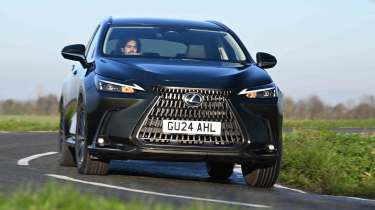
| Pros | Cons |
|
|
Excellent fuel consumption and strong residual values mean that the NX neatly sidesteps some typically premium running costs. During our time testing an NX 350h, we averaged almost 45mpg, which places it ahead of petrol-powered versions of the BMW X3 and Mercedes GLC. Do plenty of driving in town, and that figure will climb higher, because the NX’s powertrain can lean on its electric side more heavily in stop-start traffic.
On a motorway, there’s little to separate its overall efficiency from some of the German competition, although their diesel models will have a slight edge over the Lexus at a steady 70mph cruise.
Although more expensive to buy, the NX 450h+ PHEV should prove to be cheaper to run, and should still see fuel economy above 40mpg while running on petrol power once the battery has run down. With regular charging, our long-term Lexus NX 450h averaged 70mpg after six months and nearly 6,500 miles of driving.
| Model | MPG | CO2 | Insurance group |
| NX 350h | 49.5mpg | 129g/km | 32 |
| NX 350h AWD | 47.0mpg | 135g/km | 35 |
Electric range, battery life and charge time
Charging the NX 450h+’s 18.1kWh battery shouldn’t be an issue, because topping up using a 7kW home wallbox (from 0-100 per cent) should take just under three hours.
The 450h+ can cover over 45.7 miles on all-electric power from a single charge of its battery, according to the official figures from Lexus. The battery is covered by a separate three-year, 60,000-mile warranty, which can be extended by 12 months or 10,000 miles at a time (just like the manufacturer’s warranty) up to 10 years or 100,000 miles with an annual Hybrid Health Check that comes as part of your franchised dealer servicing. You can continue to pay for an annual Hybrid Health Check beyond that point for a further 12 months of warranty cover for the hybrid system until the car is up to 15 years old.
| Model | Battery size | Range | Insurance group |
| NX 450h+ AWD | 18.1kWh | 45.7 miles | 40 |
Insurance groups
Depending on the trim level and powertrain, the NX’s insurance groups range between 32 and 43. The NX 350h Premium AWD sits in group 36.
Tax
The full-hybrid powertrain can’t drop emissions down to PHEV levels, but they’re significantly lower than mild-hybrid and pure internal combustion alternatives. At 136g/km, however, that still places the NX in the 32 per cent Benefit-in-Kind band, so it remains an expensive choice for company car drivers. As with all of its rivals, a list price over £40,000 means that the NX is subject to the luxury car tax, which sets annual VED rates from the second year onwards at £600.
Depreciation
The Lexus holds its value extremely well. Aside from one or two outliers (the full hybrid in range-topping Takumi spec, for example), the entire range maintains between 57 and 62 per cent of its original value after three years or 36,000 miles, according to our valuation experts. Premium trim is the best bet with either powertrain, holding 57.7 per cent of its value with a full-hybrid set-up and 61.7 per cent as a PHEV. Those numbers beat rivals such as the BMW X3, Alfa Romeo Stelvio, Audi Q5, Mercedes GLC and Volvo XC60.
Interior, design & technology
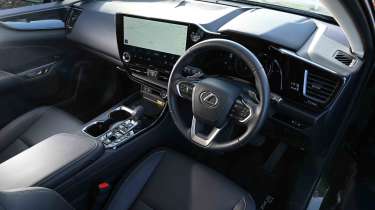
| Pros | Cons |
|
|
From the outside, buyers might find it hard to tell if they’re looking at a first or second-generation NX. There are some sharper lines and tweaks to the front and rear light clusters, but the basic familiar design remains. Underneath is a different matter, though, because the NX now sits on Toyota’s TNGA-K platform, which is why it’s available with plug-in hybrid technology.
The cabin is smartly designed and neatly finished, but the layout doesn’t quite have the wow factor or unique feel that some previous Lexus models brought to the party.
Interior and dashboard design
Getting in is the first curiosity with the NX. As is becoming more popular, the door handles are electrically actuated rather than mechanical, but while other cars with this tech have sleek, slim levers, the NX keeps chunky handles that you squeeze the inside of to unlock them. This doesn’t quite align with the gentle electronic pop as they open.
Once inside, the design looks smart, but is dominated by the huge central touchscreen. One of its disadvantages is that it limits the amount of creativity open to designers when shaping a cabin. For all the failings of older Lexus infotainment set-ups, their smaller displays allowed for distinctive and luxurious-feeling interiors, and some of that originality has been lost slightly with the NX.
As with any car cabin furnished with lashings of gloss black trim, it looks nice when it’s new, but minor scratches may well cause it to appear increasingly scruffy as it gets older. Any physical controls that remain feel pleasing to use, though. We like the analogue temperature controls, which have cleverly been installed over the touchscreen to still offer a tactile response. With screens growing ever larger, it’s a design that we hope other brands might use as a source of inspiration.
Materials and build quality
The overall finish inside the NX is as immaculate and well detailed as we’ve come to expect from Lexus. The leather is soft, plus the few plastics on display are sturdy and feel like they’re built to last.
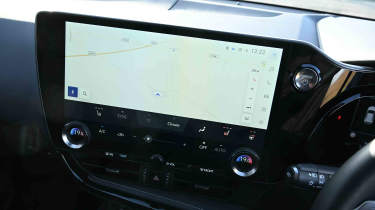
Infotainment, sat-nav and stereo
This version of the NX was among the first Lexus models to benefit from an overhauled infotainment system, which transformed what was previously one of the brand’s weakest areas. The car can be upgraded with the Lexus Link Pro system, which expands the screen size from the standard 9.8 inches to 14 inches. Not only does it get rid of the slightly clumsy black borders around the edge of the dash, but it also offers super-fast loading times, clear menu structures and a simple interface.
Expert view, on design
“At a time when many manufacturers are playing it safe with exterior colour palettes, it’s refreshing to see Lexus be a little more daring with some colours. Take the Sonic Copper option; the almost rose-gold look was introduced on the all-electric RZ, and while it won’t be to everyone’s taste, I’m glad that it exists. I’m fond of the Terrane Khaki (costing around £800) that’s available on the NX. I’d pair that with a tan interior (Hazel, in Lexus speak) – even if that means upgrading to the Premium Plus trim.”
Alex Ingram, chief reviewer, conducted a twin test between the NX and the latest BMW X3
Boot space & practicality

| Pros | Cons |
|
|
The NX is roomy enough both for people and their possessions, so it easily ticks all the boxes for a big, spacious, five-seat SUV, although some rivals have a greater towing capacity.
Dimensions and size
The NX is a little bigger overall than its predecessor, but it’s about the same size as most of its close rivals. The Audi Q5, BMW X3 and Mercedes GLC are all a little wider, but overall length is broadly the same. The NX’s shape falls somewhere between an upright SUV and coupe-style model, and in contrast to its German rivals there’s just one bodystyle.
| Dimensions | |
| Length | 4,660mm |
| Width | 1,865mm |
| Height | 1,660mm |
| Number of seats | Five |
| Boot space | 521-1,411 litres |
Driving position, seats & space in the front
A lofty position with plenty of adjustment means that it’s easy for drivers of various sizes to feel at home behind the wheel. Over-the-shoulder visibility is a little compromised by thick C-pillars and a modestly sized rear window; rivals like the X3 are a little better in this respect.
One neat idea is the lid for the cubby between the front seats. It’s hinged on both sides, meaning that either the driver or the front passenger can open it on their side. The centre console also houses a couple of deep cup-holders and a wireless smartphone charging pad, but ahead of that, there is an odd little cubby beside the USB ports, which we struggled to find a use for.

Seats & space in the back
Sink into the soft rear seats, and the NX reveals a generous amount of rear kneeroom. There are some rivals that offer a touch more headroom, but we’re nit-picking because the roof is still high enough for adults well over six feet tall to sit comfortably and without complaint. A wide rear bench and similarly soft centre seat mean everyone will be comfortable, even when seated three abreast.
Fitting a child seat can be a bit fiddly, though, because the Isofix mounting points are buried deep into the back of the seat cushions – we prefer it when they’re set into an easy-to-access plastic housing.
Boot space
At 521 litres, the boot space is generous, if not quite at the top of the class. A couple of tethering hooks and side storage partitions add some practicality, as does an underfloor storage area. Fold the back seats down and you get an almost level floor in the boot, and the volume grows to 1,411 litres.
Towing
Hooking up a trailer or a small caravan shouldn’t be an issue, although the NX’s maximum braked towing capacity of 1,500kg is behind the best in the class. The towing capacity remains unchanged whether you choose the NX 350h or NX 450h+.
Expert view, on practicality
“There are some useful touches in the boot that make up for a slight shortage of space when compared with rivals. The boot opening is wide and square, and the load lip is almost level, while a 12-volt socket is a handy addition.”
Alex Ingram, chief reviewer, conducted a twin test between the NX and the latest BMW X3
Reliability & safety

| Pros | Cons |
|
|
Lexus has long been a brand celebrated for its superb ownership experience, so it might be a surprise to see that in our 2024 Driver Power customer satisfaction survey, it finished outside the top 10, dropping to 12th place overall (out of 32).
However, a dive into the data reveals that when it comes to overall reliability, Lexus has still got it, ranked as sixth best overall. The brand’s worst score in our survey came in the practicality category – that may be an issue on some of the smaller Lexus models, but it isn’t really a concern for NX buyers.
The model was awarded five stars by Euro NCAP when it was tested in 2022, achieving strong marks across all four categories, so it scores highly from a safety perspective.
| Key standard safety features | Euro NCAP safety ratings |
|
|
Buying and owning
- Best buy: Lexus NX 350h Premium AWD
The Premium model has all the kit you’d need while still offering decent value for money. The extra reassurance of the four-wheel drive system comes without too much of an impact on fuel efficiency, too. We’d only upgrade to the NX 450h+ if we had the ability to keep the battery charged at all times.
At three years and 60,000 miles, the standard Lexus warranty looks fairly unremarkable. However, drivers who stick to the service schedule and take their car to a main dealer for maintenance work will get an extra 12 months’ cover each time – and this can run right up until the car is 10 years old.
Lexus offers a three-year service plan with the NX. It can be paid in monthly instalments, but it is quite expensive, at a little over £1,400 at the time of writing. That makes it roughly £500 more than BMW’s equivalent service package over the same period.
Alternatives
As already mentioned, the Lexus NX is a rival for the German ‘big three’ in the class, the BMW X3, Audi Q5 and Mercedes GLC, and it stacks up pretty well when compared with them. Other options that are available include the ageing Alfa Romeo Stelvio and Volvo XC60, but the Jaguar F-Pace is now only available on the used market.
Frequently Asked Questions
We’ve voted the Lexus NX the best medium-sized premium SUV in our New Car Awards for a few years running. It manages to offer a decent drive and great efficiency, while also being at or near the front of a number of other categories.
